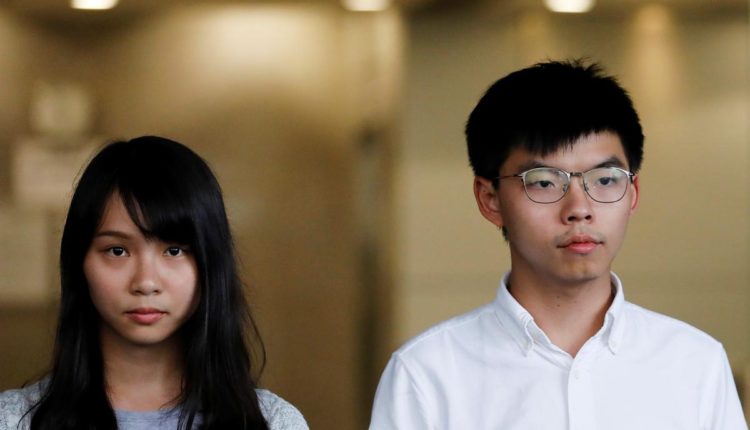Hong Kong activists arrested: Joshua Wong and others charged
A number of prominent pro-democracy activists and lawmakers have been arrested by police in Hong Kong.
Joshua Wong and Agnes Chow, from the Demosisto party, were arrested and charged on Friday, while party chairman Ivan Lam, who is not currently in Hong Kong, was charged in his absence.
Three pro-democracy lawmakers have also been arrested.
It comes after a mass march, scheduled for Saturday, was banned by officials and called off by organisers.
If demonstrations went ahead, it would mark the 13th consecutive weekend of protests in Hong Kong.
The movement started as rallies against a controversial extradition bill – now suspended – which would have allowed criminal suspects to be sent to mainland China for trial.
They have since expanded in scope, becoming a broader pro-democracy movement in which clashes have grown more violent.
Who has been arrested?
At least three activists and three lawmakers were detained during the 24-hour police crackdown.
The Demosisto party said Mr Wong, 23, was “suddenly pushed into a private car on the street” while walking to a train station at around 07:30 (23:30 GMT Thursday).
Both he and Ms Chow were taken to police headquarters in Wan Chai and were charged with unlawfully organising a rally on 21 June, at which protesters blockaded police headquarters for 15 hours.
My arrest shows the government answers our request for a dialogue with batons, tear gas, rubber bullets and mass arrest. Our freedom of assembly and other fundamental rights are eroded.
The 23-year-old first rose to prominence as the poster boy of a protest movement that swept Hong Kong in 2014.
Andy Chan, founder of the Hong Kong National Party which campaigns for the territory’s independence, also said he was detained on Thursday night while trying to board a flight from Hong Kong airport.
Amnesty International called the arrests “an outrageous assault” on free expression and EU foreign policy chief Federica Mogherini labelled the latest developments “extremely worrying”.
“We expect the authorities in Hong Kong to respect the freedom of assembly, expression and association as well as the right of people to demonstrate peacefully,” she said.
Three pro-democracy lawmakers, Cheng Chung-tai, Au Nok-hin and Jeremy Tam Man-ho, were also arrested for offences relating to past protests.
About 900 people have been arrested since the demonstrations began in June.
In almost three months of increasingly violent clashes, hundreds have already been detained, but the latest, high-profile arrests are being seen as much more political in nature.
At a press conference, the police insisted they were following the law, with commander Kwok Pak Chung making it clear there might be further arrests.
With unconfirmed reports that Beijing has turned down a request by Hong Kong’s chief executive to formally scrap the controversial extradition bill that first sparked the protests, the authorities are toughening their message.
That may dissuade some protesters, but past experience suggests others are likely to be enraged even further.
What about Saturday’s march?
The Civil Human Rights Front, a group behind other record-breaking gatherings, cancelled an anti-extradition law march scheduled for Saturday after failing to overturn a police ban against it.
Organiser Jimmy Sham apologised to the public, but said their priority was to hold protests that were both legally and physically safe.
Another organiser, Bonnie Leung, told the BBC she believed that people would “be clever” and find “legal and safe ways” to protest in spite of the cancellation.
“I don’t think the movement will end at all,” she said. “If the government is trying everything to threaten people away, or it’s trying to wait for the movement to die down, it’s not going to achieve that.”
Hong Kong police on Friday appealed to members of the public to cut ties with “violent protesters” and warned people not to take part in the now-cancelled march.
The recent protests have been characterised as leaderless and activist Nathan Law, who co-founded Demosisto, said nobody was inciting protesters.
“There is no leader or platform in this movement,” he said. “If someone is inciting citizens to go to the streets, it must be the harsh political violence of [Hong Kong’s leader] Carrie Lam.
Media captionHong Kong police fired a gunshot and used water cannon during Sunday’s protests
“Demosisto has never been ‘leaders’ of the movement. Every Hong Kong citizen who has come out has done so according to his own conscience. No matter how the Chinese Communist Party attempts to smear this, nothing can change that fact.
“We appeal to the public not to be afraid of political violence… and continue to fight for their rights. Hong Kong people, go!”
How is China responding?
Beijing has repeatedly condemned the protesters and described their actions as “close to terrorism”. Reuters news agency reports that earlier in the summer China denied a request by Carrie Lam to fully withdraw the extradition bill to help ease tensions and end the unrest.
The protests have frequently escalated into violence between police and activists, with injuries on both sides, and activists are increasingly concerned that China might use military force to intervene.
On Thursday, Beijing moved a new batch of troops into Hong Kong. Chinese state media described it as a routine annual rotation.
But an editorial in the China Daily newspaper emphasised the presence of Chinese troops was not symbolic, and they would have “no reason to sit on their hands” if the situation deteriorated.
Source: BBC




Comments are closed.